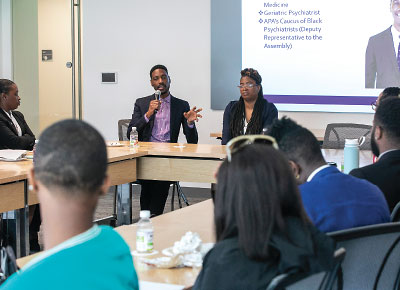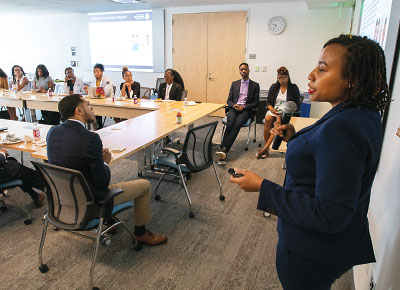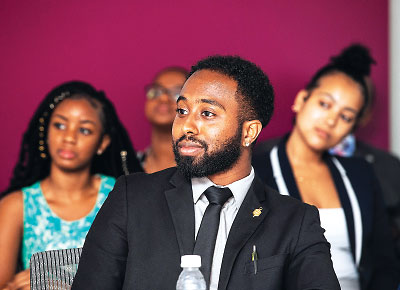Black Psychiatrists Offer Students a Glimpse of Life as a Physician
Abstract
When APA’s Division of Diversity and Health Equity brought black psychiatrists and students from Howard University together in June, the discussion covered everything from the basics of residency to the need for self-care in a field where black physicians and trainees still encounter racism.
More than 40 medical and pre-medical students from APA’s Pre-Health Summer Scholars Program for Howard University students gathered at APA last month for a lively learning session about medical school, psychiatry, and what it’s like to be a black psychiatrist in today’s America. In a setting that encouraged frank dialogue, Danielle Hairston, M.D., president of the APA Caucus of Black Psychiatrists, and Steven Starks, M.D., deputy representative to APA’s Assembly on behalf of APA’s Caucus of Black Psychiatrists, responded candidly to students’ questions about the profession and shared their own experiences as black psychiatrists. Starks is also a geriatric psychiatrist and a Health and Aging Policy Fellow.

Steven Starks, M.D., a geriatric psychiatrist and a Health and Aging Policy Fellow, talks with Howard University students about what it’s like to be a psychiatrist in a program begun by APA to encourage black college students to enter medicine. At right is Danielle Hairston, M.D., who moderated the program.
At times their words elicited strong reactions as they sought to provide the students with a real-world understanding of both the uphill battles blacks often face in education, training, and practice and the rewards of working in a field that comes with daily opportunities to save a life or improve a community. The event was hosted by APA’s Division of Diversity and Health Equity (DDHE).
Hairston is a consultation-liaison psychiatrist and the psychiatry residency training director at Howard University Hospital, a nationally recognized teaching hospital that provides medical services to underserved communities in Washington, D.C. Hairston spoke of how both black and white patients sometimes make assumptions about her based on her race and their own perceptions of physicians.
“[I’ve had white patients] ask how I can identify with them if I’m black. But then [some] black patients will say, ‘You don’t know what it’s like to be me. You’re rich, and you went to medical school.’ But I am not rich,” Hairston said. “Sometimes patients ask me if I’m there to [pick up] their tray or if I’m a social worker—everything except whether I’m the physician or psychiatrist.”

Nadia Woods, M.S.W., senior program manager in APA’s Division of Diversity and Health Equity (DDHE), gives the Howard University students a brief overview of DDHE, APA, and psychiatry.
Starks shared what was going through his mind when he visited a patient at the patient’s home in Jasper, Texas—the town where 49-year-old James Byrd Jr., a black man, was brutally murdered by three white supremacists in 1998. “I had to think of what I would do if I am stopped by police and how people might react to a tall, black man walking up to them or ringing their doorbell,” Starks said.
Both Hairston and Starks assured the students that medical education includes training in how to respond if patients become aggressive or violent. They encouraged the students to be aware of their own comfort levels and to ask for assistance in situations in which they feel uncomfortable or afraid.
Hairston and Starks offered the students sage advice on other topics as well, including what to expect at each stage of training and how to manage their own mental health and personal lives.
“No matter what field of medicine you’re in, it’s important to maintain your own mental health and wellness. Psychiatry is rewarding, but it’s not always easy. Dedicate some amount of time to yourself every day,” Hairston said. “Medicine is important, but you always have to have some type of outside life because it can weigh on you.

Recent graduate Emanuel Demissie was among more than 40 Howard University students who participated in APA’s Pre-Health Summer Scholars Program for Howard University students at APA headquarters.
“In medical school, think about what interests you and what your needs and goals are in life,” said Starks. “You [also] need to know what you’re getting into when you make choices about what you want to do. In choosing psychiatry, my connection with APA helped sustain my focus,” said Starks, who traced his involvement with APA back to his second year of medical school.
Session attendee and recent Howard University graduate Emanuel Demissie, who will be working in clinical trial management with Genentech in San Francisco while he applies to medical school, described the impact of the APA program on the students.
“Each Howard student left the DDHE’s program more knowledgeable on how psychiatrists contribute to the health and wellness of local communities. This will in turn play an integral role in our futures when deciding what specialty to pursue after completing medical school,” said Demissie, who is also a participant in APA’s Black Men in Psychiatry Early Pipeline Program.
Nadia Woods, M.S.W., a senior program manager in DDHE, reflected on the importance of APA providing a venue for students and experienced psychiatrists to dialogue.
“Research shows that workforce diversity and inclusion in medicine is critical. Programs like this ensure that APA is continuing to advance the field of psychiatry and contributing to a diverse and inclusive psychiatric workforce,” Woods told Psychiatric News in an interview after the event. “Students having a space to authentically engage with two dynamic, black psychiatrists and envision themselves impacting the mental health and well-being of black communities was powerful.” ■
More information on APA’s Division of Diversity and Health Equity is posted here.



